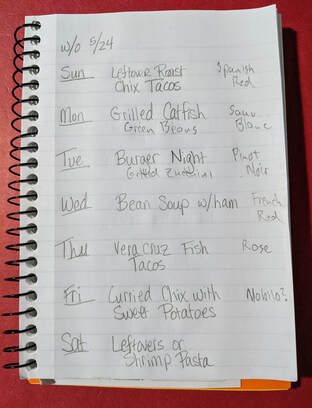
One of the main reasons to meal plan during this pandemic is that it will eliminate excess trips to the grocery store. When every trip means possible exposure to COVID-19, going to the store as little as possible makes good sense. I've been posting my meal plans on my Facebook page these past couple of months hoping people find them helpful, that people are inspired to do their own meal planning, and that they see it can be done fairly easily. Meal planning is one of the main tools I use to thrive while living with three autoimmune diseases (yes, three!). It helps me focus on those foods that are most nutritious for my body and stay away from foods likely to cause autoimmune flare-ups. Flare-ups for me look like exhaustion, joint pain, and brain fog.
To create a new habit, you need to prioritize it. And this leads to tip #1: schedule time to meal plan. Sit down with your calendar and a weather forecast (for grilling) and determine what you will have each night of the week. Tip #2: write your meal plan down in a place where you are likely to see it. We use a notebook that we keep on the kitchen counter. Some people I know meal plan on their phone and set up reminders to do it. Once you have that done, then write your grocery list based on your meal plan.
If meal planning is a new habit you are creating, you want to set yourself up to succeed. Tip #3: keep it simple so that the habit is more likely to stick. What do I mean? Start with planning dinners using recipes you already know how to make. Tuesday night after a long day of Zoom calls is no time to try some fancy Martha Stewart recipe that uses every pot in the kitchen. Instead, start with what you know. Make the more challenging recipes or ones you've never tried before on the weekends or evenings when you have more time to prepare.
When I was a student at the Institute for Integrative Nutrition, Dr. David Katz, at the time a professor at the Yale School of Medicine and an expert in nutrition and obesity, was one of our lecturers. I'll never forget when he said that a lot of dietary theories agree on one thing: Americans do not eat enough green vegetables. Tip #4: focus on vegetables, especially green ones. We include a big salad every night with dinner as our main source of greens, and I tend to eat spinach at breakfast. There are lots of benefits to eating more green vegetables, including improved brain function and they are good for your bones. And if you find yourself resisting and coming up with excuses, it's worth eating them to protect your health!
To recap, here are four tips to help you meal plan:
- Schedule time to meal plan.
- Write it down where you will see it often and remember it is there.
- Keep it simple so you are more likely to do it and form an awesome meal planning habit.
- Focus on vegetables, especially green ones.
And there you have it. I hope you find these tips helpful. If you already plan your meals, what are some of your best tips?

 RSS Feed
RSS Feed